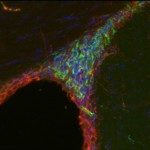Bio-protocol 9(4): e3170. DOI:10.21769/BioProtoc.3170.
Olfaction is the first sensory modality to develop during fetal life in mammals, and plays a key role in the various behaviors of neonates such as feeding and social interaction. Odorant cues (i.e., mother or predator scents) can trigger potentiation or inhibition of ultrasonic vocalizations (USV) emitted by pups following their isolation. Here, we report how USV are inhibited by olfactory cues using a sonoolfactometer that has been designed to quantify precisely olfaction in pups congenitally infected by cytomegalovirus. This olfactory-driven behavioral test assesses the USV emitted in presence of unfamiliar odorants such as citral scent or adult male mouse scent. We measure the number of USV emitted as an index of odorant detection during the three periods of the 5-min isolation time of the pup into the sono-olfactometer: first period without any odorant, second period with odorant exposure and last period with exhaust odorant. This protocol can be easily used to reveal olfactory deficits in pups with altered olfactory system due to toxic lesions or infectious diseases.



